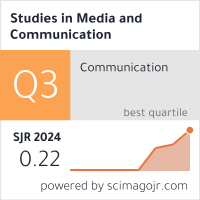Is She a Feminist Icon Now? Barbie 2023 Movie and a Critique of Postfeminism
Abstract
This study seeks to analyse Greta Gerwig’s Barbie 2023 movie, exploring how it playfully interacts with academic criticisms by incorporating them into its narrative in a humorous way. This article intends to investigate how the movie serves as a critique of postfeminist media texts by highlighting how it affects women's psychological well-being, illustrating the ways in which it can be debilitating. The movie also highlights the unfulfilled psychological aspects of feminism, rendering it a feminist text in that regard. A thematic analysis of the movie prompts a discussion on how a character who has been a postfeminist icon transforms into a feminist narrative identity.
In the beginning of the film, Barbie resides within a paradisiacal realm characterized by unwavering agency and authority. She lives in Barbieland where “every day is a great day”. This mirrors the way in which both girls and boys immerse themselves in their imaginative play, constructing their microcosms replete with agency and the role of the protagonist (Yakali Camoglu, 2020). However, as individuals mature into adulthood, the shift is palpable and the world they encounter demands a relinquishment of some of that power, leading them to transition from active agents to potentially objectified subjects in certain contexts. This is symbolised in Barbie’s own transition from Barbieland (imaginations of childhood) to the Real World (adulthood) in the end of the movie.
The movie engages in the critique that Barbie encounters, as her portrayal symbolizes the unrealistic standards imposed on women, portraying them as unattainable ideals. Although her initial intent -supposedly- is to empower girls by rescuing them from the confines of stereotypical maternal roles and introducing them to diverse occupations, her portrayal inadvertently immerses them in a realm where not only physical perfection but also success in careers and relationships is expected—a realm where limitless possibilities coexist with a profound burden. This postfeminist portrayal offers a vision of boundless potential achievable through belief in self, but concurrently fosters a burdensome mental strain and self-objectification among women, entangling them in a constant cycle of self-critique.
This predicament forms the crux of Barbie's critical error, leading her to relinquish her paradisiacal abode, Barbieland, and embrace the realm of real-world womanhood. By assuming the complex roles women navigate, Barbie forfeits her idyllic sanctuary and immerses herself in a world where the concept of "perfection" is inherently absent, as authenticity takes precedence over plastic constructs.
After identifying the existing literature on Barbie, the article proceeds to present the theoretical framework, which is postfeminism, and outlines the research methodology. The results of the thematic analysis reveal Barbie's active engagement in critiquing the postfeminist media culture in which she was a prominent figure. This pivotal process underscores Barbie's latest contribution to the realm of media studies, transforming from a text entrenched in postfeminist ideals to embodying a feminist narrative.
Full Text:
PDFDOI: https://doi.org/10.11114/smc.v12i1.6478
Refbacks
- There are currently no refbacks.
Studies in Media and Communication ISSN 2325-8071 (Print) ISSN 2325-808X (Online)
Copyright © Redfame Publishing Inc.
To make sure that you can receive messages from us, please add the 'redfame.com' domain to your e-mail 'safe list'. If you do not receive e-mail in your 'inbox', check your 'bulk mail' or 'junk mail' folders.
If you have any questions, please contact: smc@redfame.com
------------------------------------------------------------------------------------------------------------------------------------------------------

